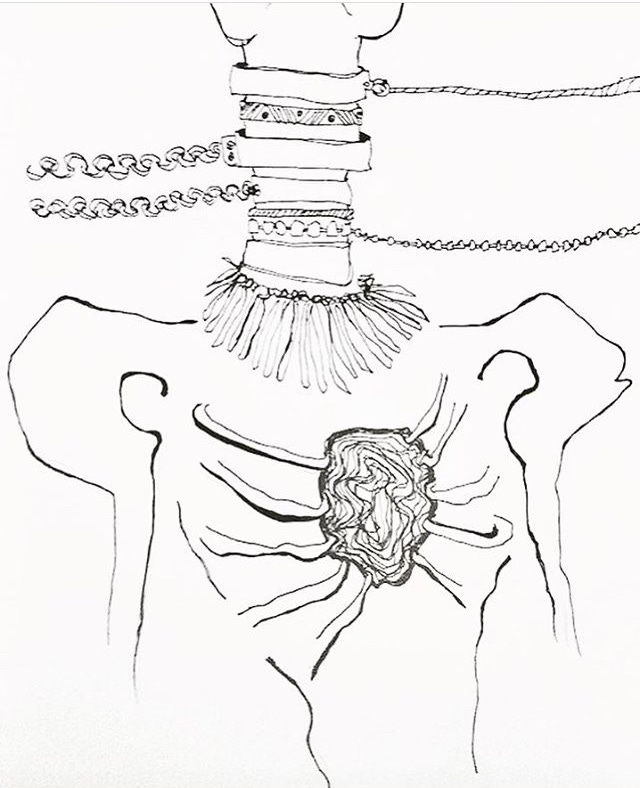The "SOME PEOPLE" Essays
Is What I Am, Not Enough? by Reveca Torres | Edited by Kimberly J. Soenen
(Untitled. Black ink on paper by Reveca Torres.)
In the summer of 2019, I felt my chest being pulled apart by my ribs, opening up a hole for my heart to be ripped out. There’s a hole and the flesh is having a hard time scarring over.
It was June of 2018, Mexican children—including newborns—at the southern border of the United States had been detained and families were being violently separated.
Children were being incarcerated in cages, without their parents.
If I had a child I would be wondering: Has my baby eaten? Are they sick? Are they getting bullied? Are they exposed to sexual abuse? But mostly, how scared must those children be? I’m scared for them. Feeling scared feels horrible. I felt hopeless. My heart was hurting. I found myself crying throughout the day.
In every context—especially health—why do humans treat other humans as “less than” and “other?”
The violent language, actions and policies of the current United States administration moved me to write about Equal Rights and Social Justice because it makes me feel I have no value to anyone in the administration, and that all my identities—everything I AM—have no worth.
There was talk about “Grab em’ by the pussy” and doing “anything you want” to women. Their stance on Reproductive Health Rights and countless other policies were an aggression towards me as a woman.
When they called Mexicans “rapists and murderers”— and not just Mexicans, all brown people—that was an aggression towards me as a Mexican-American.
When the then-candidate running for President publicly mocked a man with a disability, that was an aggression towards me as a person with a disability.
When they cut funding from the National Endowment for the Arts, that was an aggression towards me as a working artist.
What’s next?
All of this was going through my mind and heart when I created this piece. The pressure of all of my responsibilities and being involuntarily chained to different healthcare systems is overwhelming.
I am alive because I have caregivers: they come to my home, get me up in the morning, get me into bed at night, help prepare my meals, shower, and get dressed. They keep me alive. I am stuck having to rely on Medicare, Social Security, and Medicaid, but those tax-financed programs allow me to hire caregivers. For such an intimate and honorable job, they hardly earn a living wage. It’s not right. They deserve more.
Chance, circumstance and luck changed the course of my life when I was 13 years old. One second. A car crash. Paralysis. Disability.
I’m stuck, attached to these supports—literally life support—not by choice, but rather in order to live and be a productive member of society. The importance that is placed on being “productive” and being a “contributing member of society” in the United States is overwhelming because not everyone is able to contribute in the same way. What level of productivity deems a person valuable or worthy?
Is what I AM, not enough? What is enough? Who is enough?
ABOUT
Reveca Torres uses painting, illustration, photography, film, movement, and other media as forms of expression and tools for advocacy and social justice. Torres is the Founder and Executive Director of BACKBONES after her friends and family started a fundraising campaign in order to help pay for medical expenses after a spinal cord injury (SCI). She realized the importance of a support system to help reach one’s goals after an injury and the impact others with similar injuries had — they provided both motivation and confidence that couldn’t be found elsewhere. With the support and guidance of many, she and co-founders Veronica Gott, Patricia Mikicic and Annie Gonzalez put a long-time goal into motion and transformed BACKBONES into what it is today: a place to connect with others with the purpose of learning, teaching, and sharing.
In her forthcoming documentary, Torres imagines how her disabled ancestors Frida Kahlo, Vincent Van Gogh, and Henri Matisse lived and created. Through letters and artifacts, she finds that they’ve created a path for contemporary disabled artists, yet their struggles parallel her own. As Reveca connects with present-day artists with disabilities, together they imagine a society in which the barriers they face no longer exist and disability art and culture are celebrated in the art canon. Learn more about Reveca Torres and her projects here.
Visit “SOME PEOPLE”




